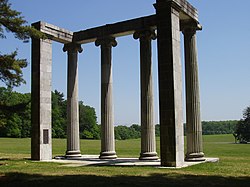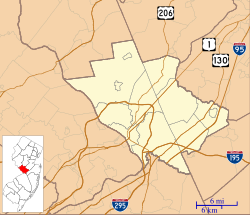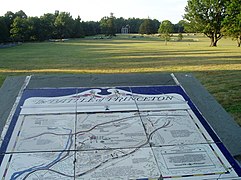Princeton Battlefield
Princeton Battlefield Historic District | |
 | |
| Location | Mercer County, New Jersey |
|---|---|
| Nearest city | Princeton |
| Coordinates | 40°19′51″N 74°40′32″W / 40.33083°N 74.67556°W |
| Area | 681 acres (276 ha) |
| Website | NJDEP |
| NRHP reference No. | 66000466[1] (original) 89000761 (increase 1) 100003698 (increase 2) |
| NJRHP No. | 1751, 1752, 1753[2] |
| Significant dates | |
| Added to NRHP | October 15, 1966 |
| Boundary increases | October 10, 1989 April 26, 2019 |
| Designated NHLD | January 20, 1961[3] |
| Designated NJRHP | May 27, 1971; May 12, 1972; April 10, 1989 |
The Princeton Battlefield in Princeton, Mercer County, New Jersey, United States, is where American and British troops fought each other on January 3, 1777, in the Battle of Princeton during the American Revolutionary War. The battle ended when the British soldiers in Nassau Hall surrendered. This success, following those at the Battle of Trenton on December 26, 1776, and the Battle of the Assunpink Creek the day before, helped improve American morale.[3][4]
Princeton Battlefield State Park
[edit]Princeton Battlefield State Park is a 681-acre (2.8 km2) state park located in Princeton. The park preserves part of the site of the Battle of Princeton (January 3, 1777), which was a victory for General George Washington's revolutionary forces over British forces. The park is maintained by the New Jersey Division of Parks and Forestry, and is located on Mercer Road (Princeton Pike), about 1.5 miles south of Princeton University and 3.8 miles north of Interstate 295/95.[5] The park was established in 1946 on approximately 40 acres (0.16 km2).[6]
Highlights of the park include the Princeton Battlefield site; the Clarke House Museum; the site of the Mercer Oak, a tree which stood in the middle of the battlefield until recent years; the Ionic Colonnade designed by Thomas U. Walter (fourth Architect of the U.S. Capitol); and a stone patio marking the grave of 21 British and 15 American soldiers killed in the battle. A poem was written for the site by Alfred Noyes, Poet Laureate of England.
The park's hiking trails lead to the Delaware and Raritan Canal and to the 588-acre (2 km2) adjacent property of the Institute for Advanced Study.
The Princeton Battle Monument is located in town near Princeton University on non-adjacent park property at Stockton Street and Bayard Lane.
Clarke House Museum
[edit]The Thomas Clarke House Museum was built in 1772 by the third generation of Quakers at Stony Brook. The house is furnished in the Revolutionary period and contains military artifacts and battle exhibits, as well as a research library.
During the battle Hugh Mercer was brought to the Clarke House and treated unsuccessfully by Benjamin Rush.
Threatened development
[edit]Part of the battlefield is now a state park, while other portions remain under threat of development.[1] For several years, the Institute for Advanced Study has been attempting to build faculty housing on the portion of Princeton Battlefield known as Maxwell's field.[7][8] The Princeton Battlefield Society is protesting the project in court, and national and local preservation organizations are working to prevent construction on the property.[9] The American Battlefield Trust, based in Washington, D.C., has reached agreement with the institute to purchase almost 15 acres of the land for $4.5 million, more than $1 million above the site's appraised value.[10] The Trust and its partners had already acquired and preserved 9 acres (0.036 km2) of the battlefield.[11] On May 30, 2018, the Trust announced that it had finalized the purchase after raising almost $3.2 million from private donors, which was matched by an $837,000 grant from the National Park Service and the Mercer County Open Space Assistance Program. The completed purchase ended the long dispute over how and whether the battlefield land would be developed.[12]
Princeton Battlefield / Stony Brook Village Historic District
[edit]In 1989 the National Register of Historic Places designation of the Battlefield was expanded to form the Princeton Battlefield / Stony Brook Village Historic District.[13] Princeton's original settlers were Quaker farmers along the Stony Brook immediately to the south and west of the battlefield. The Stony Brook Meeting House and Cemetery was well established at the time of the revolution and in full sight of the battle. The meetinghouse and associated farms are part of the contiguous preserved area that includes the battlefield.[14]
Gallery
[edit]-
The Princeton battlefield with its map
-
The Clarke House
-
The Stony Brook meetinghouse in 1936 from the Historic American Buildings Survey
See also
[edit]References
[edit]- ^ a b "National Register Information System – (#66000466)". National Register of Historic Places. National Park Service. November 2, 2013.
- ^ "New Jersey and National Registers of Historic Places – Mercer County" (PDF). New Jersey Department of Environmental Protection – Historic Preservation Office. December 30, 2019. p. 10.
- ^ a b "Princeton Battlefield". National Historic Landmark summary listing. National Park Service. Archived from the original on February 25, 2009. Retrieved August 31, 2009.
- ^ Greenwood, Richard (August 5, 1975). "National Register of Historic Places Inventory/Nomination: Princeton Battlefield". National Park Service. Retrieved March 12, 2020. With accompanying two photos
- ^ New Jersey Dept. of Environmental Protection, Trenton, NJ (2014). "Princeton Battlefield State Park."
- ^ "Princeton Battlefield". The Cultural Landscape Foundation.
- ^ "Institute for Advanced Study prepares for Maxwell's Field construction". December 4, 2015.
- ^ "Veterans for Princeton organization formed to oppose construction on historic field - The Daily Princetonian".
- ^ "Preserve - don't destroy - piece of Princeton Battlefield". The Times of Trenton. July 14, 2016.
- ^ Will, George. "A battle to save the Princeton battlefield". The Washington Post.
- ^ [1] American Battlefield Trust "Saved Land" webpage. Accessed May 23, 2018.
- ^ [2] Planet Princeton, May 30, 2018, "Institute for Advanced Study and American Battlefield Trust finalize deal that enlarges Princeton Battlefield Park." Accessed June 4, 2018.
- ^ Craig, Robert. "Princeton Battlefield / Stony Brook Village Historic District". National Register of Historic Places. National Park Service.
- ^ Hageman, J.F. (1878). History of Princeton and Its Institutions. Vol. 2. J.B. Lippincott & Company. p. 415. ISBN 9780598745644. Retrieved April 14, 2015.
External links
[edit]- American Revolutionary War sites
- National Historic Landmarks in New Jersey
- Historic districts in Princeton, New Jersey
- State parks of New Jersey
- Parks in Mercer County, New Jersey
- Museums in Princeton, New Jersey
- American Revolutionary War museums in New Jersey
- Institutions accredited by the American Alliance of Museums
- National Register of Historic Places in Mercer County, New Jersey
- Historic districts in Mercer County, New Jersey
- New Jersey Register of Historic Places
- American Revolution on the National Register of Historic Places
- Historic districts on the National Register of Historic Places in New Jersey







